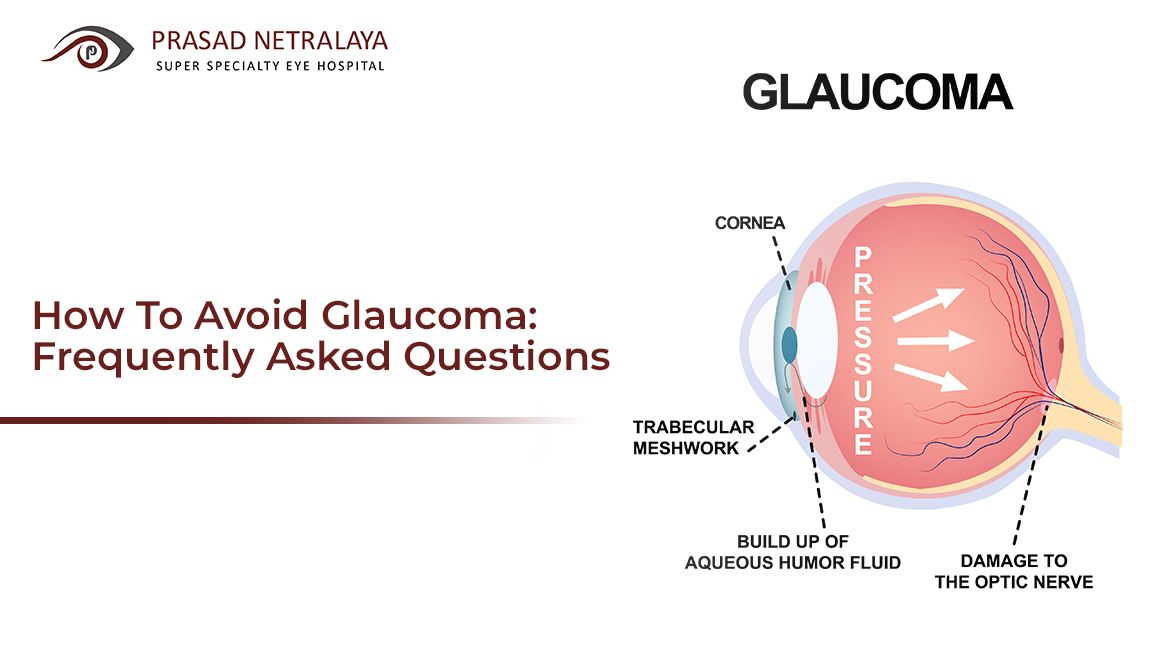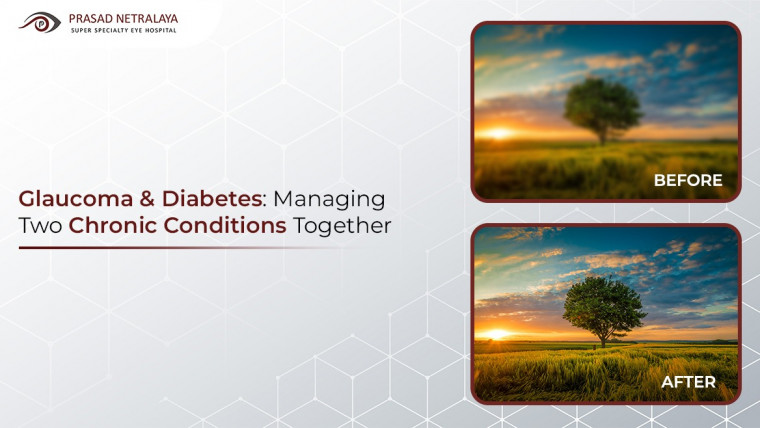A study in 2010 found that around 11.2 million people aged 40 and above suffer from glaucoma in India. While these numbers may have increased in the past decade, what’s important is focusing on prevention and cure.
Since we frequently get questions on glaucoma, we decided to put this article together, compiling some of the most commonly asked questions on this condition, including how to avoid glaucoma.
Let’s begin.
Table of Contents
What Is Glaucoma?
Glaucoma is a disorder that causes vision loss due to optic nerve damage. It usually happens when fluid builds up in the eye and increases pressure.
The condition can sometimes manifest for no apparent reason, and it can be passed down genetically. The optic nerve transmits visual information to the brain; when it’s damaged, an individual loses their ability to see. If not addressed, the eyesight loss could be permanent.
Glaucoma is characterized by damage to the optic nerve due to an increase or decrease in intraocular pressure (IOP). However, this isn’t the end of the story since there have been examples of glaucoma patients experiencing optic nerve injury while having normal eye pressure. For this reason, glaucoma is more accurately described as a set of linked disorders, given the wide range of possible causes and manifestations.
Are Glaucoma and Diabetes Related?
Yes, glaucoma and diabetes are related. Diabetics have a higher risk of contracting glaucoma than the general population.
Diabetes increases the risk of developing several eye disorders known together as diabetic eye diseases. Some of these disorders include glaucoma, diabetic macular oedema, and cataracts.
When Does Ocular Pressure Become Problematic?
Unfortunately, there doesn’t seem to be a standard deviation or percentage that can be used to define “normal” ocular pressure, so it’s hard to say when ocular pressure becomes problematic. Although normal ocular pressure ranges from 12–22 mmHg, this might vary from person to person.
In some people with ocular pressure lower than 22, symptoms persisted even after treatment. You should have your eye pressure often checked by an eye doctor if you believe it may be an issue.
Will Glaucoma Cause Blindness in All Cases?
No, glaucoma will not cause blindness in all cases. In fact, the vast majority of patients suffering from glaucoma don’t experience blindness. Although glaucoma can cause blindness, it typically only affects around 5% of those with the disease. However, roughly 10% of patients also have vision loss.
Nearly all glaucoma patients may be kept stable with the right therapy and monitoring. The prognosis for glaucoma improves if the patient actively participates in treatment with their physician.
What’s Life With Glaucoma Like?
Even though you may need to take eye drop prescriptions every day and visit the doctor for checkups regularly, you should be able to carry on with your life as usual, despite your glaucoma diagnosis. You’re free to start again and plan ambitious projects. Supportive members of the eye care community, such as the Glaucoma Society of India, will keep exploring new ways to manage your condition and a cure for glaucoma.
Some commonplace actions, like driving or participating in sports, may become more complex. Some potential side effects of glaucoma include a loss of contrast sensitivity (the ability to distinguish between different shades of the same colour), glare issues, and light sensitivity.
Helpful advice: Have faith in your own common sense. You should probably avoid nighttime driving if you have problems seeing the road. Be smart and plan most of your journey for daylight hours.
Wearing sunglasses or lenses with a tint can reduce glare and increase contrast. Colours like yellow, amber, and brown are ideal for reducing the glare of fluorescents. You may find that brown-lensed glasses improve your vision on sunny days. Try utilizing yellows and ambers in their milder tones on cloudy days and at night. You need to try several things and find what works best for you.
Also Read : What are the Causes of Glaucoma? And More on its Types and Treatment
Are Glaucoma Eye Drops Expensive?
No, glaucoma drops are not that expensive. Most glaucoma patients have to spend around Rs. 400–500 a month on glaucoma medication (which may include eye drops).
How Often Should Glaucoma Patients Be Checked?
Glaucoma patients should be checked once a week or once a month until their condition stabilizes. You may still need regular exams with your eye doctor, even if your eye pressure is normal. As part of the treatment plan, you and your eye doctor will decide how frequently you need to have checkups.
What if One of My Family Members Has Glaucoma?
If you or a member of your family has glaucoma, it’s important to encourage others in the family to have frequent eye exams to monitor their eye pressure and optic nerves in case they, too, get the condition. Many people don’t get regular eye exams because they don’t realize glaucoma can sometimes have no noticeable symptoms.
Is There a Permanent Cure for Glaucoma?
Unfortunately, there is no permanent cure for glaucoma. Lost eyesight due to glaucoma cannot be recovered. Medicine, laser therapy, and surgery can slow or halt eyesight loss.
How To Avoid Glaucoma?
While there’s no permanent cure for the disease, here’s how to avoid glaucoma by taking certain precautions:
- Get your eyes examined regularly.
- Know and understand your family’s health history.
- Wear eye protection.
- Take prescribed eye drops.
Can Glaucoma Be Traced Back to a Family Trait?
Yes, glaucoma can be traced back to a family trait. However, glaucoma is not always a family illness, and the causes of the disease’s genesis remain unclear in many cases.
What Does Glaucoma Recovery Look Like?
Neurons (nerve cells) and the optic nerve cannot be replaced if they are damaged or destroyed in the retina. However, several laboratories are working to find viable alternatives for missing retinal neurons. Potentially useful in the future treatment of glaucoma and other neurological disorders.
How To Avoid Glaucoma For Good
Awareness about disorders like Glaucoma is very important. The most important things you can do to avoid glaucoma are checking your family history and getting regular eye check-ups.
To know more about eye health, treatment for infections, and other eye disorders, visit the Prasad Netralaya website. We’re one of the top eye hospitals in the region, and we’d be happy to help you out.



